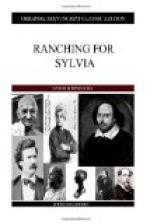Her words conveyed no hint of the stern struggle between duty and inclination, but George guessed it. This girl, he thought, was one not to give up lightly the career she had chosen.
Then she changed the subject with a smile.
“I suspect that my father approves of you, perhaps because of what you are doing with the land. I think I may say that if you have any little difficulty, or are short of any implements that would be useful, you need only come across to us.”
“Thank you,” George responded quietly.
“Mr. West mentioned that you were on a farm in this country once before. Why did you give it up?”
“Somebody left me a little money.”
“Then what brought you back?”
She was rather direct, but that is not unusual in the West, and George was mildly flattered by the interest she displayed.
“It’s a little difficult to answer. For one thing, I was beginning to feel that I was taking life too easily in England, It’s a habit that grows on one.”
He had no desire to conceal the fact that he had come out on Sylvia’s behalf—it never occurred to him to mention it. He was trying to analyze the feelings which had rendered the sacrifice he made in leaving home a little easier.
“I don’t think the dread of acquiring that habit is common among your people,” Flora said mischievously. “It doesn’t sound like a very convincing reason.”
“No,” replied George, with a smile. “Still, it had some weight. You see, it isn’t difficult to get lazy and slack, and I’d done nothing except a little fishing and shooting for several years. I didn’t want to sink into a mere lounger about country houses and clubs. It’s pleasant, but too much of it is apt to unfit one for anything else.”
“You believe it’s safer, for example, to haul stovewood home through the Canadian frost or drive a plow under the scorching sun?”
“Yes; I think I feel something of the kind.”
Flora somewhat astonished him by her scornful laugh.
“You’re wise,” she said. “We have had sportsmen here from your country, and I’ve a vivid memory of one or two. One could see by their coarse faces that they ate and drank too much; and they seemed determined to avoid discomfort at any cost. I suppose they could shoot, but they could neither strip a gun nor carry it on a long day’s march. The last party thought it needful to take a teamload of supplies when they went north after moose. It would have been a catastrophe if they had missed their dinner.”
“Going without one’s dinner has its inconveniences,” said George.
“And thinking too much about it has its perils,” she retorted.
George nodded. He thought he knew what she meant, and he agreed with it. He could recall companions who, living for pleasure, had by degrees lost all zest for the more or less wholesome amusements to which they had confined their efforts. Some had become mere club loungers and tattlers; one or two had sunk into gross indulgence. This had had its effect on him: he did not wish to grow red-faced, slothful, and fleshy, as they had done, nor to busy himself with trivialities until such capacities for useful work as he possessed had atrophied.




